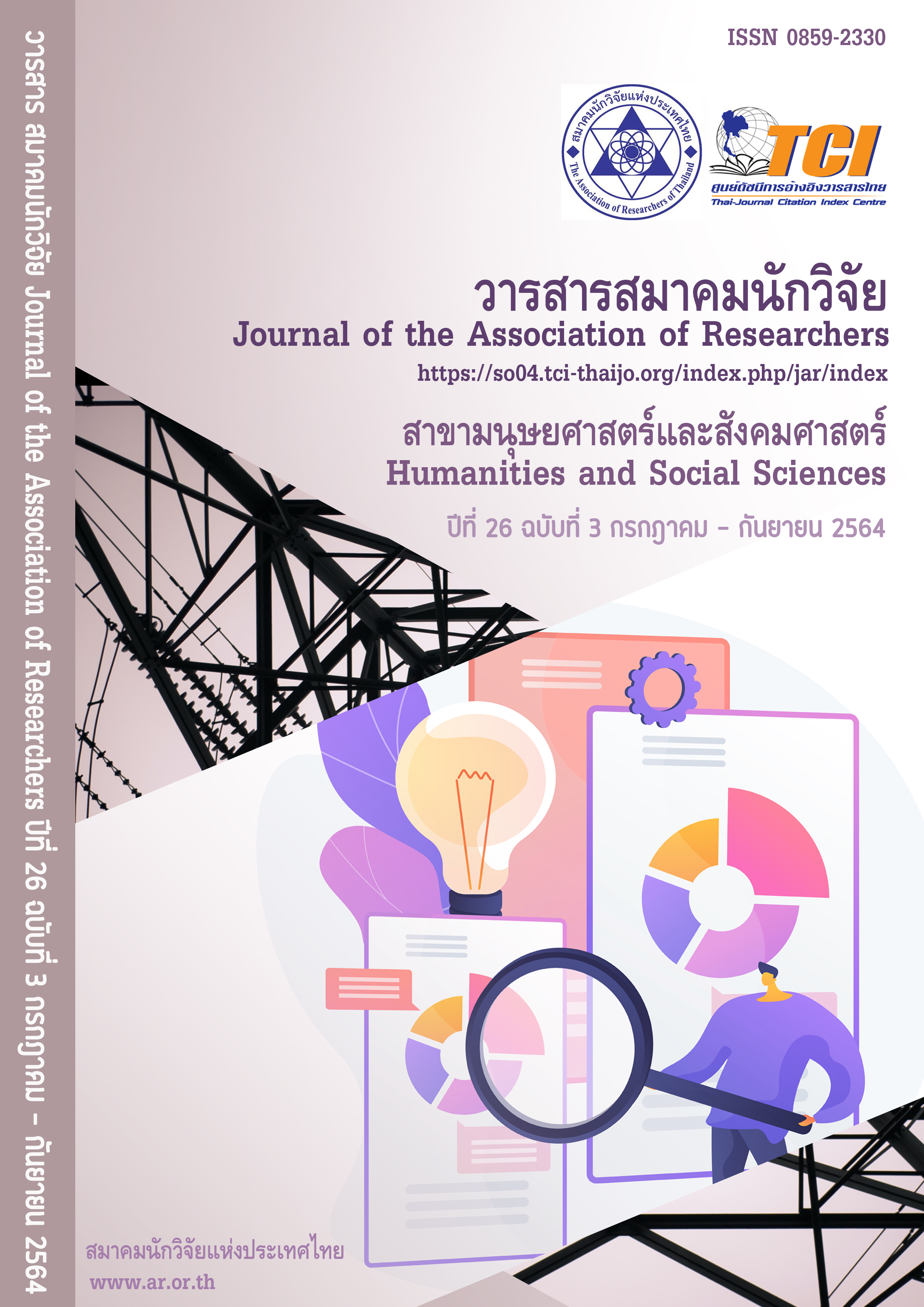Approaches for Development of Cultural Tourism in Nakonsrithammarat Province
Main Article Content
Abstract
The objectives of this research are 1). To study the potential of Nakhonsrithammarat Province in the development of cultural tourism 2). Using qualitative research methods It's an in-depth interview. There were 30 key informants from the government, private sector, people and academics in Nakhonsrithammarat Province.
The results of the study found that 1) Nakhonsrithammarat Province has the potential to develop cultural tourism based on identity and Thai way of life. 2) An integrated and sustainable approach to cultural tourism development Nakhonsrithammarat Province found that there was a need for the development of individuals or personnel with volunteer spirit in community tourism development. There should be a promotion from government agencies, namely the provincial administrative organization, sub-district, or related agencies with sufficient budget support. For budget allocation to purchase equipment, materials, objects that communicate knowledge and language to tourists and able to understand and recognize the good culture of Nakhonsrithammarat Province Management Nakhonsrithammarat Province is a province that is the center of the southern region. A big city it should be organized to exchange, co-ordinate and provide information to each other. Provide opportunities for people in the community to play a role in the development and management of tourism in the area.
Keywords: Cultural tourism, Tourism development, Nakhonsrithammarat Province
Article Details
บทความที่ปรากฏในวารสารนี้ เป็นความรับผิดชอบของผู้เขียน ซึ่งสมาคมนักวิจัยไม่จำเป็นต้องเห็นด้วยเสมอไป การนำเสนอผลงานวิจัยและบทความในวารสารนี้ไปเผยแพร่สามารถกระทำได้ โดยระบุแหล่งอ้างอิงจาก "วารสารสมาคมนักวิจัย"
References
กระทรวงการท่องเที่ยวและกีฬา. (2558). แผนพัฒนาเศรษฐกิจและสังคมแห่งชาติ
ฉบับที่ 11 พ.ศ. 2555-2559. สืบค้นเมื่อวันที่ 11 มีนาคม 2559, จาก http://www.tourism-asean.org.
กระทรวงการท่องเที่ยวและกีฬา. (2558). ยุทธศาสตร์การท่องเที่ยวไทย พ.ศ. 2558–2560. สืบค้นเมื่อ 25 มีนาคม 2559, จาก http://www.mots.go.th.
เคลาส์ ชวาบ. (2559). การปฏิวัติอุตสาหกรรมครั้งที่4. แปลโดย ศรรวริศา เมฆไพบูลย์. กรุงเทพฯ: Amarin HOW-TO.
ดอน แท็บสก็อต.(2559). เศรษฐกิจดิจิทัล. แปลโดย พรศักดิ์ อุรัจฉัทชัยรัตน์. กรุงเทพฯ:แมคกรอ-ฮิล.
ปิยะชาติ อิศรภักดี. (2559). BRANDING 4.0 (พิมพ์ครั้งที่ 1). กรุงเทพฯ: Amarin HOW-To.
พยอม ธรรมบุตร. (2558). เอกสารประกอบการเรียนการสอนวิชา การจัดการท่องเที่ยวเชิงอนุรักษ์.กรุงเทพฯ: สถาบันพัฒนาการท่องเที่ยว มหาวิทยาลัยศรีนครินทรวิโรฒ.
พยอม ธรรมบุตร. (2559). เอกสารประกอบการเรียนการสอนวิชา การจัดการสิ่งแวดล้อมเพื่อการท่องเที่ยว.กรุงเทพฯ: วิทยาลัยการจัดการ มหาวิทยาลัยพะเยา.
พยอม ธรรมบุตร. (2560). เอกสารประกอบการเรียนการสอนเกี่ยวกับองค์ประกอบของการท่องเที่ยว. กรุงเทพฯ: วิทยาลัย การจัดการ มหาวิทยาลัยพะเยา.
วิจารณ์ พานิช. (2553). มหาวิทยาลัยไทยต้องเปลี่ยนลุคส์ใหม่เพื่อสังคม สร้างจิตสำนึกใหม่การศึกษา. สืบค้นเมื่อ 16 มกราคม 2560, จาก https://www.isranews.org/thaireform/thaireform-talk-interview/thaireform-talk-social/13483-2010-05-07-12-05-37.html.
สมบัติ กุสุมาวลี.(2558). เศรษฐกิจเชิงสร้างสรรค์,กรุงเทพฯ : จุฬาลงกรณ์มหาวิทยาลัย
สุภางค์ จันทวานิช. (2558). วิธีการวิจัยเชิงคุณภาพ. กรุงเทพฯ : สำนักพิมพ์แห่งจุฬาลงกรณ์มหาวิทยาลัย.
ธีระภัทรา เอกผาชัยสวัสดิ์.(2553).ชุมชนศึกษา.กรุงเทพฯ : สำนักพิมพ์แห่งจุฬาลงกรณ์มหาวิทยาลัย.
Alastair Morrison.(2013). Marketing and Management Tourism Destination. Routledge. 711 Third
Avenue,New York,NY10017
Ohridska – Olson, R. (2010). The Creative Tourism Business Model, Cultural
Realms, URL: http://www.culturalms.com
Pine,B.J.LL.HJ, Gilmore (1999),The experience Economy: work is theatre and every business a stage.
Boston, Ma. Haward Business School Press.


